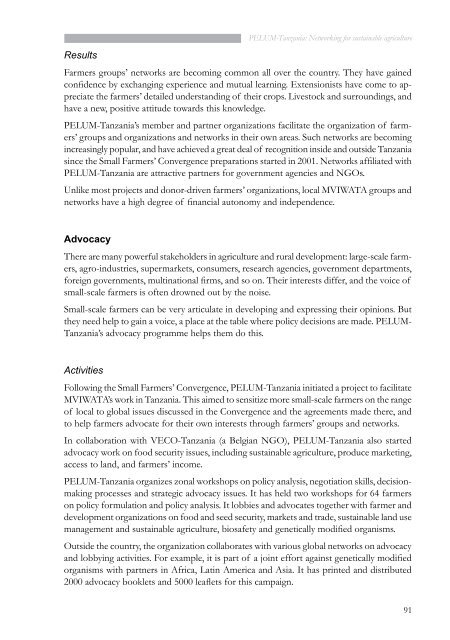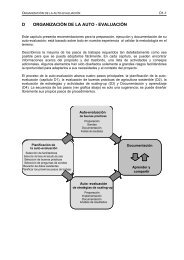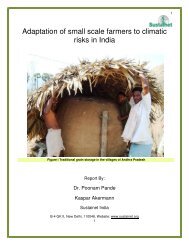cases from tanzania - Sustainet
cases from tanzania - Sustainet
cases from tanzania - Sustainet
Create successful ePaper yourself
Turn your PDF publications into a flip-book with our unique Google optimized e-Paper software.
Results<br />
PELUM-Tanzania: Networking for sustainable agriculture<br />
Farmers groups’ networks are becoming common all over the country. They have gained<br />
confidence by exchanging experience and mutual learning. Extensionists have come to appreciate<br />
the farmers’ detailed understanding of their crops. Livestock and surroundings, and<br />
have a new, positive attitude towards this knowledge.<br />
PELUM-Tanzania’s member and partner organizations facilitate the organization of farmers’<br />
groups and organizations and networks in their own areas. Such networks are becoming<br />
increasingly popular, and have achieved a great deal of recognition inside and outside Tanzania<br />
since the Small Farmers’ Convergence preparations started in 2001. Networks affiliated with<br />
PELUM-Tanzania are attractive partners for government agencies and NGOs.<br />
Unlike most projects and donor-driven farmers’ organizations, local MVIWATA groups and<br />
networks have a high degree of financial autonomy and independence.<br />
Advocacy<br />
There are many powerful stakeholders in agriculture and rural development: large-scale farmers,<br />
agro-industries, supermarkets, consumers, research agencies, government departments,<br />
foreign governments, multinational firms, and so on. Their interests differ, and the voice of<br />
small-scale farmers is often drowned out by the noise.<br />
Small-scale farmers can be very articulate in developing and expressing their opinions. But<br />
they need help to gain a voice, a place at the table where policy decisions are made. PELUM-<br />
Tanzania’s advocacy programme helps them do this.<br />
Activities<br />
Following the Small Farmers’ Convergence, PELUM-Tanzania initiated a project to facilitate<br />
MVIWATA’s work in Tanzania. This aimed to sensitize more small-scale farmers on the range<br />
of local to global issues discussed in the Convergence and the agreements made there, and<br />
to help farmers advocate for their own interests through farmers’ groups and networks.<br />
In collaboration with VECO-Tanzania (a Belgian NGO), PELUM-Tanzania also started<br />
advocacy work on food security issues, including sustainable agriculture, produce marketing,<br />
access to land, and farmers’ income.<br />
PELUM-Tanzania organizes zonal workshops on policy analysis, negotiation skills, decisionmaking<br />
processes and strategic advocacy issues. It has held two workshops for 64 farmers<br />
on policy formulation and policy analysis. It lobbies and advocates together with farmer and<br />
development organizations on food and seed security, markets and trade, sustainable land use<br />
management and sustainable agriculture, biosafety and genetically modified organisms.<br />
Outside the country, the organization collaborates with various global networks on advocacy<br />
and lobbying activities. For example, it is part of a joint effort against genetically modified<br />
organisms with partners in Africa, Latin America and Asia. It has printed and distributed<br />
2000 advocacy booklets and 5000 leaflets for this campaign.<br />
91




